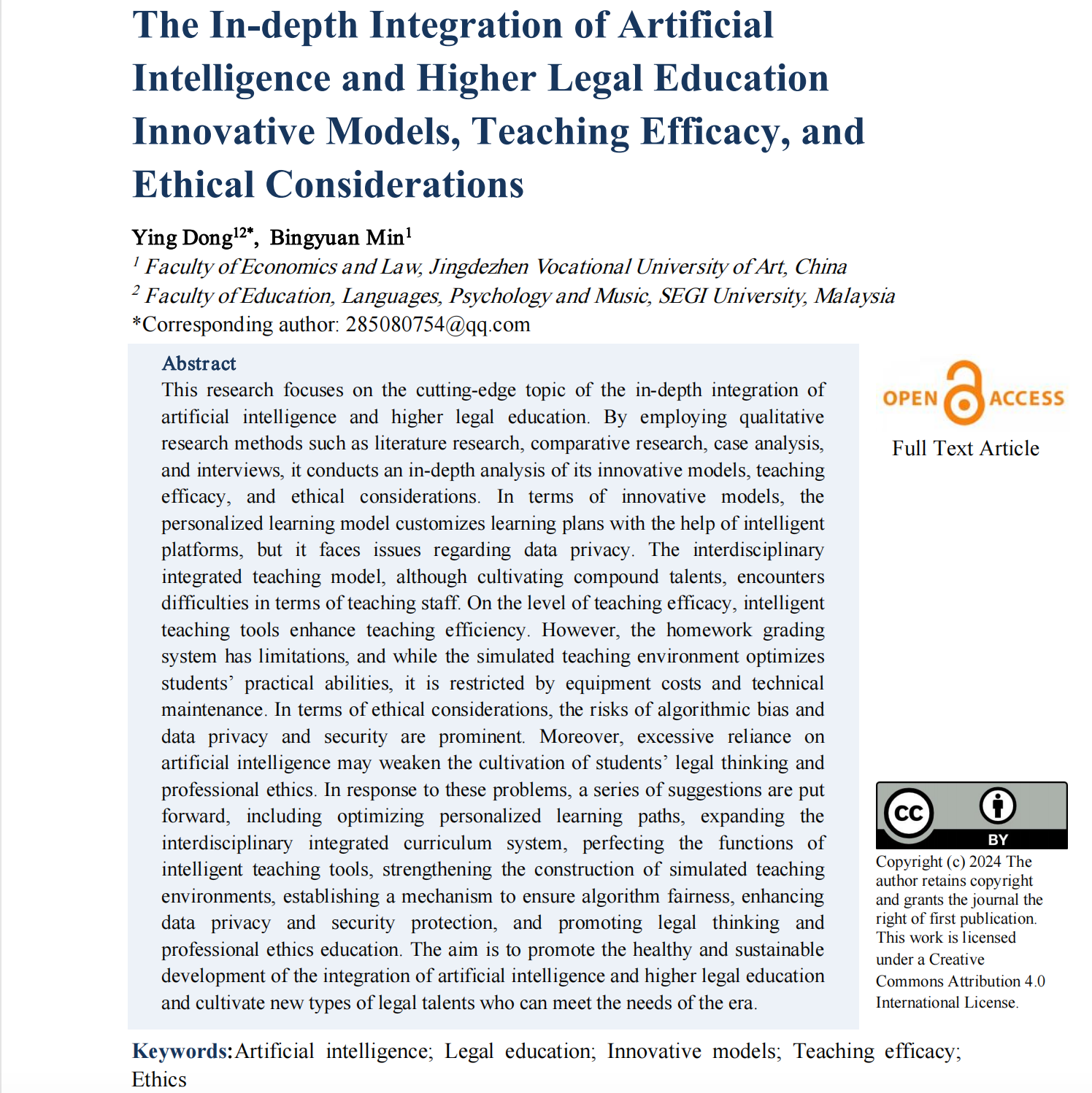The In-depth Integration of Artificial Intelligence and Higher Legal Education Innovative Models, Teaching Efficacy, and Ethical Considerations
DOI:
https://doi.org/10.5281/zenodo.14276639Keywords:
Artificial intelligence, Legal education, Innovative models, Teaching efficacy, EthicsAbstract
This research focuses on the cutting-edge topic of the in-depth integration of artificial intelligence and higher legal education. By employing qualitative research methods such as literature research, comparative research, case analysis, and interviews, it conducts an in-depth analysis of its innovative models, teaching efficacy, and ethical considerations. In terms of innovative models, the personalized learning model customizes learning plans with the help of intelligent platforms, but it faces issues regarding data privacy. The interdisciplinary integrated teaching model, although cultivating compound talents, encounters difficulties in terms of teaching staff. On the level of teaching efficacy, intelligent teaching tools enhance teaching efficiency. However, the homework grading system has limitations, and while the simulated teaching environment optimizes students’ practical abilities, it is restricted by equipment costs and technical maintenance. In terms of ethical considerations, the risks of algorithmic bias and data privacy and security are prominent. Moreover, excessive reliance on artificial intelligence may weaken the cultivation of students’ legal thinking and professional ethics. In response to these problems, a series of suggestions are put forward, including optimizing personalized learning paths, expanding the interdisciplinary integrated curriculum system, perfecting the functions of intelligent teaching tools, strengthening the construction of simulated teaching environments, establishing a mechanism to ensure algorithm fairness, enhancing data privacy and security protection, and promoting legal thinking and professional ethics education. The aim is to promote the healthy and sustainable development of the integration of artificial intelligence and higher legal education and cultivate new types of legal talents who can meet the needs of the era.
References
[1]Vegera, I. (2022). CURRENT CHALLENGES AND PROSPECTS FOR THE DEVELOPMENT OF HIGHER LEGAL EDUCATION. Vestnik of Polotsk State University. Part D. Economic and legal sciences. https://doi.org/10.52928/2070-1632-2021-59-14-103-108
[2]Kamble, R., & Shah, D. (2018). APPLICATIONS OF ARTIFICIAL INTELLIGENCE IN HUMAN LIFE. International Journal of Research -GRANTHAALAYAH. https://doi.org/10.29121/granthaalayah.v6.i6.2018.1363
[3]Rosemadi, J., & Jamaludin, S. (2022). The Liability of Artificial Intelligence's Moral Dilemma. F1000Research, 11, 1079. https://doi.org/10.12688/f1000research.73640.1
[4]De Oliveira Silva, A., & Janes, D. (2023). Artificial Intelligence in education: What are the opportunities and challenges?. Review of Artificial Intelligence in Education. https://doi.org/10.37497/rev.artif.intell.educ.v5i00.18
[5]Patel, K., & Gandhi, A. (2023). Analysing the Impact of Artificial Intelligence on Legal Research and Legal Education. International Journal of Legal Developments & Allied Issues. https://doi.org/10.55662/ijldai.2023.9501
[6]Ouyang, S., & Nai, P. (2019). Exploring Intelligent Higher Education of Law: Moot Court Based on VR and AI Technology. Proceedings of the 2019 International Conference on Pedagogy, Communication and Sociology (ICPCS 2019). https://doi.org/10.2991/ICPCS-19.2019.39
[7]Essa, S., Çelik, T., & Human-Hendricks, N. (2023). Personalized Adaptive Learning Technologies Based on Machine Learning Techniques to Identify Learning Styles: A Systematic Literature Review. IEEE Access, 11, 48392-48409. https://doi.org/10.1109/ACCESS.2023.3276439
[8]McFaul, H., & FitzGerald, E. (2019). A realist evaluation of student use of a virtual reality smartphone application in undergraduate legal education. Br. J. Educ. Technol., 51, 572-589. https://doi.org/10.1111/BJET.12850
[9]An, Q. (2023). Challenges and Responses: Reflection on Legal Education in the Age of Artificial Intelligence. Advances in Education, Humanities and Social Science Research. https://doi.org/10.56028/aehssr.6.1.279.2023
[10]Liu, Y. (2023). Innovative model of teaching in law experiment center based on LETS software. Applied Mathematics and Nonlinear Sciences, 0. https://doi.org/10.2478/amns.2023.1.00103
[11]Liu, Y., Chen, L., & Yao, Z. (2022). The application of artificial intelligence assistant to deep learning in teachers' teaching and students' learning processes. Frontiers in Psychology, 13. https://doi.org/10.3389/fpsyg.2022.929175
[12]Rico-Juan, J., Sánchez-Cartagena, V., Valero-Mas, J., & Gallego, A. (2023). Identifying Student Profiles Within Online Judge Systems Using Explainable Artificial Intelligence. IEEE Transactions on Learning Technologies, 16, 955-969. https://doi.org/10.1109/TLT.2023.3239110
[13]Radutniy, O. (2019). Legal education and the provision of legal services in the context of artificial intelligence. INFORMATION AND LAW. https://doi.org/10.37750/2616-6798.2019.2(29).273417
[14]Huang, L. (2023). Ethics of Artificial Intelligence in Education: Student Privacy and Data Protection. Science Insights Education Frontiers. https://doi.org/10.15354/sief.23.re202
[15]Reyero-Lobo, P., Daga, E., Alani, H., & Fernández, M. (2022). Semantic Web technologies and bias in artificial intelligence: A systematic literature review. Semantic Web, 14, 745-770. https://doi.org/10.3233/sw-223041

Downloads
Published
How to Cite
Issue
Section
License
Copyright (c) 2024 Ying Dong, Bingyuan Min

This work is licensed under a Creative Commons Attribution 4.0 International License.





















